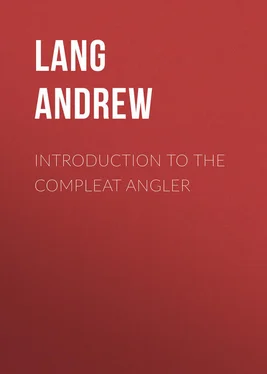Andrew Lang - Introduction to the Compleat Angler
Здесь есть возможность читать онлайн «Andrew Lang - Introduction to the Compleat Angler» — ознакомительный отрывок электронной книги совершенно бесплатно, а после прочтения отрывка купить полную версию. В некоторых случаях можно слушать аудио, скачать через торрент в формате fb2 и присутствует краткое содержание. Жанр: foreign_antique, foreign_prose, на английском языке. Описание произведения, (предисловие) а так же отзывы посетителей доступны на портале библиотеки ЛибКат.
- Название:Introduction to the Compleat Angler
- Автор:
- Жанр:
- Год:неизвестен
- ISBN:нет данных
- Рейтинг книги:3 / 5. Голосов: 1
-
Избранное:Добавить в избранное
- Отзывы:
-
Ваша оценка:
- 60
- 1
- 2
- 3
- 4
- 5
Introduction to the Compleat Angler: краткое содержание, описание и аннотация
Предлагаем к чтению аннотацию, описание, краткое содержание или предисловие (зависит от того, что написал сам автор книги «Introduction to the Compleat Angler»). Если вы не нашли необходимую информацию о книге — напишите в комментариях, мы постараемся отыскать её.
Introduction to the Compleat Angler — читать онлайн ознакомительный отрывок
Ниже представлен текст книги, разбитый по страницам. Система сохранения места последней прочитанной страницы, позволяет с удобством читать онлайн бесплатно книгу «Introduction to the Compleat Angler», без необходимости каждый раз заново искать на чём Вы остановились. Поставьте закладку, и сможете в любой момент перейти на страницу, на которой закончили чтение.
Интервал:
Закладка:
Andrew Lang
Introduction to the Compleat Angler
ANDREW LANG’S INTRODUCTION TO THE COMPLEAT ANGLER
To write on Walton is, indeed, to hold a candle to the sun. The editor has been content to give a summary of the chief or rather the only known, events in Walton’s long life, adding a notice of his character as displayed in his Biographies and in The Compleat Angler , with comments on the ancient and modern practice of fishing, illustrated by passages from Walton’s foregoers and contemporaries. Like all editors of Walton, he owes much to his predecessors, Sir John Hawkins, Oldys, Major, and, above all, to the learned Sir Harris Nicolas.
HIS LIFE
The few events in the long life of Izaak Walton have been carefully investigated by Sir Harris Nicolas. All that can be extricated from documents by the alchemy of research has been selected, and I am unaware of any important acquisitions since Sir Harris Nicolas’s second edition of 1860. Izaak was of an old family of Staffordshire yeomen, probably descendants of George Walton of Yoxhall, who died in 1571. Izaak’s father was Jarvis Walton, who died in February 1595-6; of Izaak’s mother nothing is known. Izaak himself was born at Stafford, on August 9, 1593, and was baptized on September 21. He died on December 15, 1683, having lived in the reigns of Elizabeth, James I., Charles I., under the Commonwealth, and under Charles II. The anxious and changeful age through which he passed is in contrast with his very pacific character and tranquil pursuits.
Of Walton’s education nothing is known, except on the evidence of his writings. He may have read Latin, but most of the books he cites had English translations. Did he learn his religion from ‘his mother or his nurse’? It will be seen that the free speculation of his age left him untouched: perhaps his piety was awakened, from childhood, under the instruction of a pious mother. Had he been orphaned of both parents (as has been suggested) he might have been less amenable to authority, and a less notable example of the virtues which Anglicanism so vainly opposed to Puritanismism. His literary beginnings are obscure. There exists a copy of a work, The Loves of Amos and Laura , written by S. P., published in 1613, and again in 1619. The edition of 1619 is dedicated to ‘Iz. Wa.’: —
‘Thou being cause it is as now it is ’;
the Dedication does not occur in the one imperfect known copy of 1613. Conceivably the words, ‘as now it is’ refer to the edition of 1619, which might have been emended by Walton’s advice. But there are no emendations, hence it is more probable that Walton revised the poem in 1613, when he was a man of twenty, or that he merely advised the author to publish: —
‘For, hadst thou held thy tongue, by silence might
These have been buried in oblivion’s night.’
S. P. also remarks: —
‘No ill thing can be clothed in thy verse’;
hence Izaak was already a rhymer, and a harmless one, under the Royal Prentice, gentle King Jamie.
By this time Walton was probably settled in London. A deed in the possession of his biographer, Dr. Johnson’s friend, Sir John Hawkins, shows that, in 1614, Walton held half of a shop on the north side of Fleet Street, two doors west of Chancery Lane: the other occupant was a hosier. Mr. Nicholl has discovered that Walton was made free of the Ironmongers’ Company on Nov. 12, 1618. He is styled an Ironmonger in his marriage licence. The facts are given in Mr. Marston’s Life of Walton, prefixed to his edition of The Compleat Angler (1888). It is odd that a prentice ironmonger should have been a poet and a critic of poetry. Dr. Donne, before 1614, was Vicar of St. Dunstan’s in the West, and in Walton had a parishioner, a disciple, and a friend. Izaak greatly loved the society of the clergy: he connected himself with Episcopal families, and had a natural taste for a Bishop. Through Donne, perhaps, or it may be in converse across the counter, he made acquaintance with Hales of Eton, Dr. King, and Sir Henry Wotton, himself an angler, and one who, like Donne and Izaak, loved a ghost story, and had several in his family. Drayton, the river-poet, author of the Polyolbion , is also spoken of by Walton as ‘my old deceased friend.’
On Dec. 27, 1626, Walton married, at Canterbury, Rachel Floud, a niece, on the maternal side, by several descents, of Cranmer, the famous Archbishop of Canterbury. The Cranmers were intimate with the family of the judicious Hooker, and Walton was again connected with kinsfolk of that celebrated divine. Donne died in 1631, leaving to Walton, and to other friends, a bloodstone engraved with Christ crucified on an anchor: the seal is impressed on Walton’s will. When Donne’s poems were published in 1633, Walton added commendatory verses: —
‘As all lament
(Or should) this general cause of discontent.’
The parenthetic ‘or should’ is much in Walton’s manner. ‘Witness my mild pen, not used to upbraid the world,’ is also a pleasant and accurate piece of self-criticism. ‘I am his convert,’ Walton exclaims. In a citation from a manuscript which cannot be found, and perhaps never existed, Walton is spoken of as ‘a very sweet poet in his youth, and more than all in matters of love.’ 1 1 The MS. was noticed in The Freebooter , Oct. 18, 1823, but Sir Harris Nicolas could not find it, where it was said to be, among the Lansdowne MSS.
Donne had been in the same case: he, or Time, may have converted Walton from amorous ditties. Walton, in an edition of Donne’s poems of 1635, writes of
‘This book (dry emblem) which begins
With love; but ends with tears and sighs for sins.’
The preacher and his convert had probably a similar history of the heart: as we shall see, Walton, like the Cyclops, had known love. Early in 1639, Wotton wrote to Walton about a proposed Life of Donne, to be written by himself, and hoped ‘to enjoy your own ever welcome company in the approaching time of the Fly and the Cork .’ Wotton was a fly-fisher; the cork, or float, or ‘trembling quill,’ marks Izaak for the bottom-fisher he was. Wotton died in December 1639; Walton prefixed his own Life of Donne to that divine’s sermons in 1640. He says, in the Dedication of the reprint of 1658, that ‘it had the approbation of our late learned and eloquent King,’ the martyred Charles I. Living in, or at the corner of Chancery Lane, Walton is known to have held parochial office: he was even elected ‘scavenger.’ He had the misfortune to lose seven children – of whom the last died in 1641 – his wife, and his mother-in-law. In 1644 he left Chancery Lane, and probably retired from trade. He was, of course, a Royalist. Speaking of the entry of the Scots, who came, as one of them said, ‘for the goods, – and chattels of the English,’ he remarks, ‘I saw and suffered by it.’ 2 2 The quip about ‘goods and chattels’ was revived later, in the case of a royal mistress.
He also mentions that he ‘saw’ shops shut by their owners till Laud should be put to death, in January 1645. In his Life of Sanderson, Walton vouches for an anecdote of ‘the knowing and conscientious King,’ Charles, who, he says, meant to do public penance for Strafford’s death, and for the abolishing of Episcopacy in Scotland. But the condition, ‘peaceable possession of the Crown,’ was not granted to Charles, nor could have been granted to a prince who wished to reintroduce Bishops in Scotland. Walton had his information from Dr. Morley. On Nov. 25, 1645, Walton probably wrote, though John Marriott signed, an Address to the Reader, printed, in 1646, with Quarles’s Shepherd’s Eclogues . The piece is a little idyll in prose, and ‘angle, lines, and flies’ are not omitted in the description of ‘the fruitful month of May,’ while Pan is implored to restore Arcadian peace to Britannia, ‘and grant that each honest shepherd may again sit under his own vine and fig-tree, and feed his own flock,’ when the King comes, no doubt. ‘About’ 1646 Walton married Anne, half-sister of Bishop Ken, a lady ‘of much Christian meeknesse.’ Sir Harris Nicolas thinks that he only visited Stafford occasionally, in these troubled years. He mentions fishing in ‘Shawford brook’; he was likely to fish wherever there was water, and the brook flowed through land which, as Mr. Marston shows, he acquired about 1656. In 1650 a child was born to Walton in Clerkenwell; it died, but another, Isaac, was born in September 1651. In 1651 he published the Reliquiae Wottonianae , with a Memoir of Sir Henry Wotton. The knight had valued Walton’s company as a cure for ‘those splenetic vapours that are called hypochondriacal.’
Интервал:
Закладка:
Похожие книги на «Introduction to the Compleat Angler»
Представляем Вашему вниманию похожие книги на «Introduction to the Compleat Angler» списком для выбора. Мы отобрали схожую по названию и смыслу литературу в надежде предоставить читателям больше вариантов отыскать новые, интересные, ещё непрочитанные произведения.
Обсуждение, отзывы о книге «Introduction to the Compleat Angler» и просто собственные мнения читателей. Оставьте ваши комментарии, напишите, что Вы думаете о произведении, его смысле или главных героях. Укажите что конкретно понравилось, а что нет, и почему Вы так считаете.












